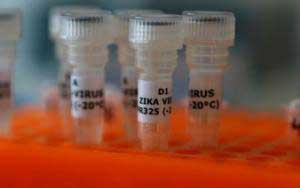Sunday Feb 22, 2026
Sunday Feb 22, 2026
Thursday, 4 February 2016 00:00 - - {{hitsCtrl.values.hits}}
 The first known case of Zika virus transmission in the United States was reported in Texas on Tuesday by local health officials, who said it likely was contracted through sex and not a mosquito bite, a day after the World Health Organization declared an international public health emergency.
The first known case of Zika virus transmission in the United States was reported in Texas on Tuesday by local health officials, who said it likely was contracted through sex and not a mosquito bite, a day after the World Health Organization declared an international public health emergency.
The virus, linked to severe birth defects in thousands of babies in Brazil, is spreading rapidly in the Americas, and WHO officials on Tuesday expressed concern that it could hit Africa and Asia as well. Zika had been thought to be spread by the bite of mosquitoes of the Aedes genus, so sexual contact as a mode of transmission would be a potentially alarming development.
Dallas County Health and Human Services said it received confirmation of the case in Dallas from the US Centres for Disease Control and Prevention.
The county department said on Twitter that the person was infected through sexual contact with someone who had travelled to Venezuela. The persoan infected did not travel to the South American country, county health officials said.
The Texas Department of State Health Services was slightly more cautious in its assessment, saying in a statement, “Case details are being evaluated, but the possibility of sexual transmission from an infected person to a non-infected person is likely in this case.”
County authorities said there were no reports of the virus being transmitted by mosquitoes in the Texas county.
Previously, international health officials had noted one case of possible person-to-person sexual transmission. But the Pan American Health Organization said more evidence was needed to confirm sexual contact as a means of Zika transmission. The medical literature also has one case in which the virus was detected in semen.
The virus has been reported in more than 30 countries and linked to microcephaly, in which babies have abnormally small heads and improperly developed brains.
The American Red Cross on Tuesday asked blood donors who have travelled to Zika virus outbreak areas such as Mexico, the Caribbean, or Central or South America to wait at least 28 days before donating.
The WHO has said the virus could infect 4 million people in the Americas. It said on Tuesday it launched a global response unit to fight the mosquito-borne virus.
“Most important, we need to set up surveillance sites in low- and middle-income countries so that we can detect any change in the reporting patterns of microcephaly at an early stage,” Dr. Anthony Costello said in Geneva. Costello is WHO’s director for maternal, child and adolescent health.
20 to 30 sites could be established worldwide, mainly in poor countries without robust healthcare systems.
Brazil is the country hardest hit by Zika. In an address to a joint session of Brazil’s Congress, President Dilma Rousseff said her government will spare no resources in mobilising to combat the mosquito that transmits the virus. With no vaccine or treatment for Zika, efforts to curb its spread have focussed on eradicating mosquito breeding sites.
Brazil, which has more than 4,000 suspected cases of microcephaly that may be linked to Zika, is scheduled to host the Olympics in Rio de Janeiro in August.
Rousseff also said Brazil and the United States will enter a partnership to develop a Zika vaccine as soon as possible to stem the spread of the virus.
French drugmaker Sanofi SA on Tuesday announced that it has launched a project to develop a vaccine against the virus, the most decisive commitment yet by a major vaccine maker. The company said its Sanofi Pasteur vaccines division would use its expertise in developing vaccines for similar viruses such as yellow fever, Japanese encephalitis and dengue.